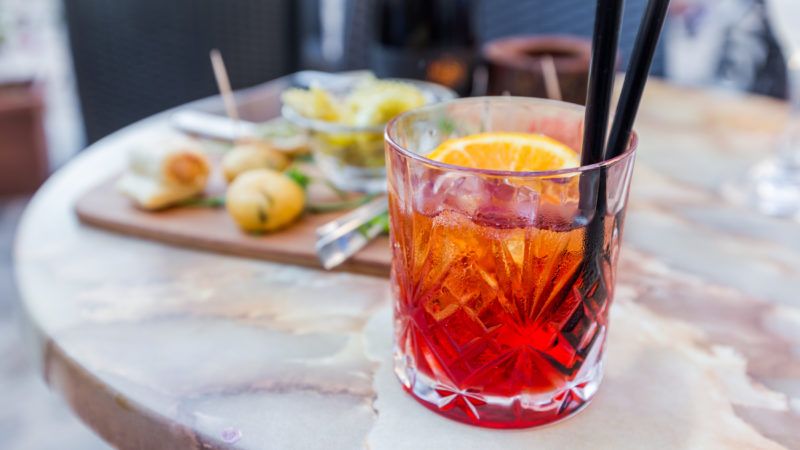Cocktail Delivery Isn't Just for Pandemics
Make this incredible service to America permanently legal.

To lessen the devastating impact of closing businesses due to the spread of COVID-19, lawmakers around the country are relaxing laws and regulations that restrict the sale and consumption of alcoholic beverages. This is a welcome development for human liberty, the mental health of people who are social distancing and self-quarantining at home, and businesses facing the prospect of permanent closure.
In a press release, the office of Texas Gov. Greg Abbott (R) announced "a waiver that will allow restaurants to deliver alcoholic beverages with food purchases to patrons, including beer, wine, and mixed drinks." He further ordered "the Texas Alcoholic Beverage Commission to waive certain provisions to allow manufacturers, wholesalers, and retailers of alcoholic beverages to repurchase or sell back unopened product."
The D.C. Council, run entirely by Democrats, passed similar emergency legislation on Wednesday, although establishments must receive written approval from the Alcohol Beverage Regulation Administration (ARBA). Those who do receive the green light will be able to deliver beer, wine, cocktails, flavored malt drinks, hard cider, and other beverages, including hard seltzer—so you can drink that White Claw guilt-free!
New York City is also on board.
Lawmakers' decision to support food freedom is a smart one, particularly as many small businesses are staring down a grim future in the face of mandatory social isolation. Restaurants will bear much of the brunt, with several states closing food-service establishments for dine-in and restricting them solely to carry-out and delivery. Approximately 30 percent of the average restaurant's revenue comes from its booze sales, which they need now more than ever before.
These regulatory exceptions raise an important question: If it's okay now, why isn't it okay all of the time?
C. Jarrett Dieterle, a senior fellow at the R Street Institute, says that the answer is two-fold: on one hand, burgeoning technology has rapidly remade the delivery sphere, with an onslaught of third-party independent contractors—those on UberEats and DoorDash, for example—inserted into a highly regulated world. The existing legal framework in most states and cities wasn't set up to accommodate those types of exchanges.
On a deeper level, our convoluted system "prioritizes different licenses for different things," hindering the ability to "creatively experiment outside of that," Dieterle says. The current coronavirus crisis has forced some lawmakers into letting private actors do just that, and they shouldn't let that experiment end.
Consumers may assume that such regulations are put in place under the guise of protecting society. Yet making it easier for companies to deliver alcohol directly to consumers' homes would cut down on drinking and driving and the obvious risks associated with that behavior.
Rules around alcohol have an exceptionally arcane and arbitrary past. Take blue laws, for instance, which were implemented after the demise of Prohibition in an attempt to keep the Sabbath Day devoid of debauchery.
I'd venture to say that many Americans feel entirely removed from that bygone era, and view such times, when alcohol consumption was a criminal offense, as a ridiculous relic of the past. But some of the laws passed in its stead still survive today and range from petty to confusing to utterly laughable.
Consider Georgia's "Mimosa Mandate," which several districts passed during the 2018 November midterms. The ballot initiative permitted restaurants to serve alcohol starting at 11:00 a.m on Sundays., contrary to a state rule barring establishments from serving booze before 12:30 p.m. The Georgia Restaurant Association estimated that restaurants would be able to make an additional $25,000 a year in the localities that successfully struck down the arbitrary roadblock.
The Peach State was far from the only culprit. As I wrote at the time:
South Carolina state law still prohibits the sale of liquor on Sundays, and retail wine and beer can only be sold if a local ordinance allows it. In Maine, you normally can't indulge until 9:00 a.m., though the law makes an exception on St. Patrick's Day. (You can get shamrocked starting promptly at 6:00 a.m.) And when Christmas falls on a Sunday, Massachusetts bans off-premises alcohol sales on Monday, because the state can't miss out on an extra opportunity to deprive people of joy. The Bay State has also outlawed happy hours.
But if the coronavirus has taught us anything, it's that those rules aren't actually necessary to protect the public. That was already apparent, but now lawmakers have essentially admitted it. Not only that, but they've inadvertently acquiesced to the idea that pointless regulations actually harm some of the most vulnerable—in this case, small business owners, decimated by a national emergency.
Though it's impossible to know if the relaxed regs will stick, Dieterle is hopeful. "Once people see the convenience of it, I think they're going to want it, and I think governments will hopefully feel some pressure to expand it permanently," he says. "Obviously I don't know for sure, but it seems to me likely that this could create, in a weird way, some momentum towards that."


Show Comments (18)